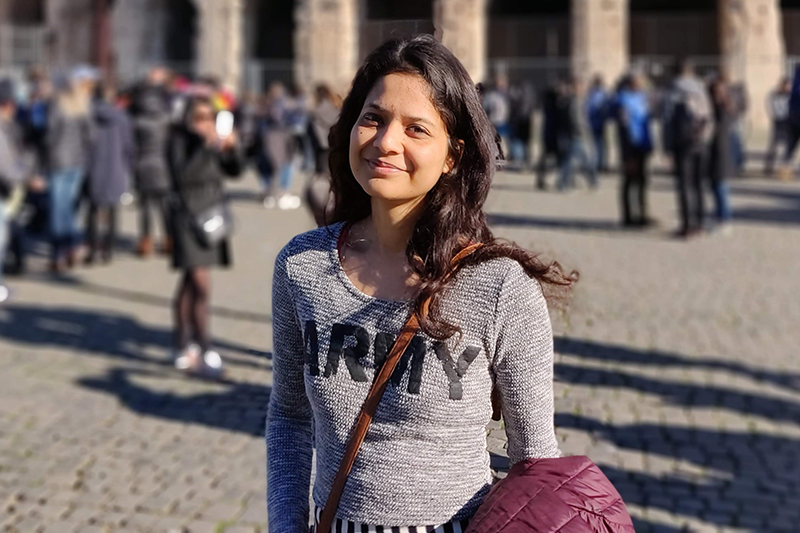The Master in Chemical Biology selects students on the basis of their academic and personal skills. We love to meet dynamic persons with a strong drive to learn and develop their scientific skills. Meet one such student, Katyayanee Neopane and discover her student path from Nepal to Switzerland and from a Bachelor degree in Biotechnology to a PhD at the Nestlé Research Center. Get inspired!
During your Master in Chemical Biology at the University of Geneva, you spent a year of research for your Master thesis in the lab of Oliver Hantschel at the EPFL. What was the topic of your research?
I worked on cytosolic delivery of small engineered proteins – termed “monobodies” – designed to selectively inhibit signaling of oncoproteins. Using a chimeric bacterial toxin, we were able to deliver a stoichiometric protein inhibitor of an endogenous target protein to cells and induce its degradation without genetic manipulation of the target cells.
What was your career path after your Master graduation?
While working in the laboratory of Oliver Hantschel, I developed my interest in research and decided to continue in this area. The next step for me was obvious and so I started a PhD at the Nestlé Research Center, affiliated at the EPFL, under the supervision of Prof. Kei Sakamoto and Prof. Andreas Wiederkehr. I am investigating on AMP-activated protein kinase regulation in cellular and metabolic processes. Although, I am working in a different field of study, the skills and knowledge I gained during my Master studies with the NCCR Chemical Biology have been very useful and valuable.
What was your most exciting science moment until now?
When our paper about the work I did during my Master thesis was accepted for publication in ACS Chemical Biology! It was the best reward.
What did you find unique about the Master in Chemical Biology at the University of Geneva and EPFL?
This multidisciplinary master program combines expertise from diverse fields. Unlike other master programs with a shorter thesis period, this master offers a year-long hands-on laboratory experience in the form of a master thesis project. Students are able to choose the laboratory according to their field of interest and the experience they gain during this time becomes invaluable for their future career. Another important aspect of the course is the journal club where we were exposed to current topics in chemical biology while enhancing our literature analysis and presentation skills.
Do you have some specific tips for a smooth transition after the Master program in Chemical Biology?
Know what you really want and what interests you the most. If this can be figured out, the transition is always smooth.
What are the skills acquired during your Master in Chemical Biology that are useful to you today?
Apart from hands-on training, which is certainly useful for a PhD, I also learned basic but very important skills for a researcher, such as time management, designing and implementing experiments and data organization. I also experienced an ease to adapt in a new research environment with the practical and theoretical knowledge that I obtained during my master studies.
What do you like the most in your PhD?
I can work independently and implement my own ideas. I am surrounded by smart people which makes it easy to discuss problems when needed. Working in an industry is sometimes different than working in a university because they have different motives, nevertheless, the main focus of PhD students is the same everywhere: to learn and grow.
Do you have any advice to future Master students in Chemical Biology?
Always follow what your interest drives you and never give up. Enjoy your work and be patient!
 After receiving her Bachelor degree in Biotechnology from Kathmandu University, Nepal, in 2015, Katyayanee Neopane joined the lab of Prof. Bruno Correia at the EPFL where she learned basic techniques in molecular biology and biochemistry. She then decided to join the Master in Chemical Biology jointly organized by the University of Geneva and the EPFL. After graduation, she started a PhD outside the academic setting.
After receiving her Bachelor degree in Biotechnology from Kathmandu University, Nepal, in 2015, Katyayanee Neopane joined the lab of Prof. Bruno Correia at the EPFL where she learned basic techniques in molecular biology and biochemistry. She then decided to join the Master in Chemical Biology jointly organized by the University of Geneva and the EPFL. After graduation, she started a PhD outside the academic setting.


Leave a comment
The editors reserve the right not to publish comments or to abridge them.